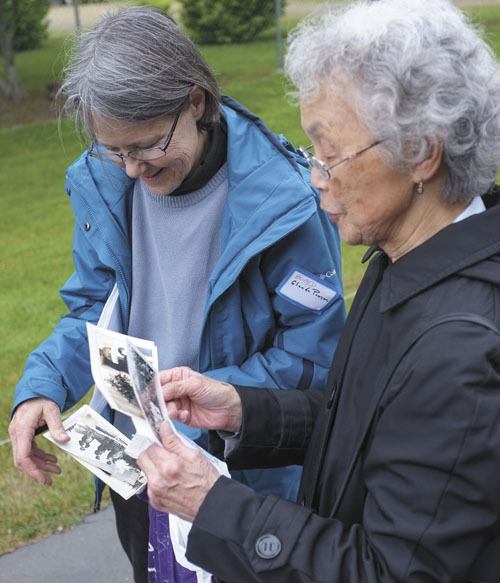Around 100 people gathered to take a tour of the famed Mukai Farmhouse Monday night, only to be greeted by a hastily erected cyclone fence that barred them from entering the property.
Those who had organized the event — several Islanders attempting to bring new leadership to the nonprofit that owns the farmhouse — held their gathering anyway, doing so on the street in front of the property and using the fence to illustrate their point.
“This is no surprise,” Lynn Greiner, a lawyer and member of the new board, told the people gathered around her, nodding towards the fence. “Part of the problem is that they act like this is their house.”
Glenda Pearson, president of the new board, noted that Mary Matthews, who founded the nonprofit, pledged years ago that she’d make the property an educational center open to the public.
“Is it open to the public?” Pearson said to laughter.
The gathering on the quiet dead-end street where the farmhouse sits was the latest turn of events in a dramatic tug-of-war over Island Landmarks, the organization Matthews founded more than a decade ago and that Island activists say is no longer legally constituted. Earlier this month, dozens of Islanders — new members of Island Landmarks — held a meeting where they ousted Matthews and the board’s three other officers, putting 11 Island activists in their place.
On Monday, the new board filed a lawsuit against Matthews and her husband J. Nelson Happy, Texas residents. Also named in the suit are the old board’s two other officers — Ken DeFrang, who lives next door to the farmhouse, and Owen Ryan, a North Carolina resident.
According to the suit, the former officers have acted illegally, using the farmhouse for their own personal use, stripping it of some of its historic artifacts, failing to adhere to the requirements of public grants they received and co-mingling their personal assets with those of the nonprofit.
The lawsuit, crafted by Island attorney Rex Stratton over the weekend, calls on the court to declare the newly elected officers the rightful leaders of the organization. It also calls on the former officers to account for all of their transactions and asks the court to impose monetary damages on them.
“You have two people who have hijacked a nonprofit corporation that had been given substantial taxpayer money to acquire this property and who … have totally mismanaged it,” Stratton said, referring to Matthews and Happy. “How do you take it back? … That’s what the whole issue is here.”
Matthews, reached Monday, declined to comment. But Happy called The Beachcomber later on Monday and said the new board acted illegally when it seized control of Island Landmarks.
“They’re definitely not the rightful board. They did not follow the bylaws,” he said.
For instance, he said, only the treasurer can deposit checks in Island Landmarks’ account; because checks from dozens of new members were deposited by someone not on the board, those Islanders are not new members and thus weren’t able to elect a new board, Happy said.
He and Matthews would be happy to turn over the farmhouse to a well-funded group interested in historic preservation, he added, noting that he has poured about $300,000 of his money into the property.
“It’s not just a little local site that a few personally motivated individuals can control. It’s a national treasure. And we have to come up with a plan for its future,” he said.
Those who gathered for the open house Monday night, meanwhile, said they were disappointed to find a fence barring their entrance. Dozens of Islanders walked along the perimeter, looking in at the modest farmhouse, built by B.D. Mukai in 1928, and the traditional Japanese garden, designed by his wife Kuni, a first-generation Japanese-American.
On the other side of the fence, two people worked on the garden, and a ladder was up against the pale green house, next to an overhang that’s beginning to rot and crumble. Matthews, dressed in white pants and a white tunic, was also spotted in the yard, talking to DeFrang and pulling weeds.
“I’m disappointed. I think the new board did a wonderful job,” said Merrilee Runyan, as she stood on the street. “I wish Mary had been graceful. … There’s tremendous support for this effort, for bringing home Island Landmarks, for reconstituting it.”
“This is so unfortunate. We came here hoping for a celebration,” added Flo Lentz, head of the historic preservation program for 4Culture, King County’s cultural arts organization and one of the funders that helped Island Landmark purchase the house a decade ago.
Mary Matsuda Gruenewald, a Japanese-American who knew B.D. Mukai and who used to babysit his grandson Milton, came from Seattle for the event. Gruenewald, who wrote a memoir called “Looking Like the Enemy: My story of imprisonment in Japanese-American internment camps,” brought several old, black-and-white photographs with her, including one that showed her as a teenage girl holding baby Milton and sitting in the farmhouse’s living room.
“I was looking forward to going in the house,” Gruenewald said, noting she hasn’t been inside it in years. “I can’t believe this. … I am enraged. … I don’t have any patience for this.”
Happy, meanwhile, decided to hold his own meeting Monday evening at the farmhouse to discuss the property’s fate; he emailed invitations Saturday to several Islanders, though not to any of the new board members. He later changed his mind and on Monday put up several signs along the fence, noting the meeting was cancelled.
Initially, those signs said, “Meeting cancelled due to rain.” But by Monday evening, the rain had stopped, and the bottom of all the signs were torn off, so that each one read, simply, “Meeting cancelled.”



